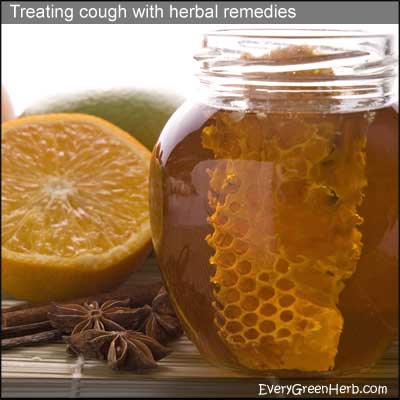Cough herbs
Natural remedies for coughs

Lemon and honey can help treat coughs and get the lungs on a path to recovery. Use with healing herbs like mullein for a powerful natural medicine.
Best herbs for coughs
Many herbs are well known for their ability to soothe a cough.
Horehound, slippery elm, mullein, wild cherry bark, elecampane, hyssop, lemon juice, and honey are the most common ingredients in cough remedies although other herbs are also useful.
Mullein and the lungs
Mullein is is a natural lung tonic that can help clear up a cough. Mullein can be used in tea or smoked in a pipe.
If you have mullein handy, try making your own tincture. See the directions for homemade mullein tincture.
Herbal cough syrups, lozenges, and teas have been used throughout history to treat coughs. Most existing herbal recipes for herbal cough remedies are tried and true. Herbs can really help to heal the lungs.
Hyssop can help heal bronchitis inflammation and stop painful coughing.
Hyssop is useful in the treatment of coughs associated with bronchitis and is best combined with mullein, plantain, or white horehound. Sage, ginger, cloves, peppermint, and rose hips are also recommended additions for added strength.
Try different combinations depending on what is available and what works best for you. Sometimes sandalwood essential oil can help heal bronchitis when nothing else seems to work.
To find help for coughing due to colds, see herbs for colds and flu symptoms.

Coughing is the body's way of clearing the lungs.
Coughing is a common symptom of upper respiratory infections, bronchitis, pneumonia, and tuberculosis. There are many types of coughs including coughs due to colds, chronic coughs, dry coughs, cigarette coughs, productive coughs, nervous coughs, hacking coughs, and whooping coughs.
Cough is one of the most common reasons that people visit a doctor or clinic. Cough can be caused by everything from smoking, to cancer, COPD, sinus problems, asthma, and gastric reflux. Allergies and pollution also cause coughing.
The coughing reflex is activated when inflammation stimulates sensory nerves in the larynx and bronchial tubes.
Coughing is usually the body's way to get rid of phlegm. When coughing becomes so severe that breathing becomes difficult, seek emergency help.
Marshmallow is a good home remedy for treating coughs.
Marshmallow is a proven demulcent and expectorant. Take an infusion, tincture, or syrup made from the flowers or leaves. Combine with a phlegm reducing herb like white horehound for an effective herbal medicine. Read more about the healing properties of the marshmallow plant.
Anise is an excellent expectorant.
Anise is an excellent expectorant that brings up mucus and relaxes hard spasms.
Anise is good for any dry, irritating cough. Combine with thyme or hyssop to bring soothe irritated tissues, so the patient can rest.
Make tea from the herbs or take in tincture form three or four times a day. Add viola for added strength.
You can also buy anise essential oil and use it in chest rubs. Do not use essential oil without diluting first with a good carrier oil and do not take it internally.

Wild cherry bark suppresses a cough.
Wild cherry bark is a powerful cough suppressant and is used for dry, nervous coughs or coughing associated with a sore throat.
Combine wild cherry with licorice, garlic, onion, and slippery elm. Wild cherry bark brings relief so that the patient can get a good night's sleep and the other herbs add extra strength.
Other herbs for treating coughs
A cough with a fever is best treated with yarrow and angelica.
Mullein is good for congestion and to protect the lungs from lasting damage.
Elder flowers and berries are often used for coughs due to sinus infection.
Horseradish is used to help stop coughing. It is also used to get rid of congestion.
Smoker's cough remedy
A hacking smoker's cough can be temporarily relieved with a mix of 2 tablespoons honey, 2 tablespoons lemon juice, 2 tablespoons cider vinegar, and 2 tablespoons of water. Take 1 teaspoon of mixture every hour throughout the day.
If you are a smoker and want to quit, visit my herbs for addiction page.
Scientific studies on herbs for coughing
Studies point out that two of the most effective plants for treating chronic cough have been developed into prescription drugs. Codeine from opium poppy and pseudoephedrine from ephedra usually require a doctor's visit and prescription.
If you are looking for alternative natural products for chronic cough, other plants are scientifically proven to help.
Many studies have been done in China.
The most often used herbs for treating cough include ginger root, honey, licorice root, apricot kernel, coltsfoot flower, ginseng root, aster root, mulberry root, schisandra fruit, fritillaria bulb, tangerine peel, pinellia rhizome platycodon root, poria, gelatin, cinnamon bark, red date, rehmannia root, and ephedra aerial parts.
Plants work in unique ways to help stop coughing.
- Ginger heals naturally by providing antimicrobial and anti-inflammatory properties.
- Honey is used whenever a syrup is needed since it coats the throat.
- Licorice root has anti-inflammatory, antiviral, antimicrobial, antioxidative, analgesic, antispasmodic, and immunomodulatory properties.
- Ginseng may especially benefit COPD patients by improving lung function and relieving shortness of breath.
- Aster root and mulberry bark are shown to inhibit airway inflammation. They also have anticancer, expectorant, and antioxidant effects.
Using essential oils in a steam bath or steam tent
Dry hard coughs benefit from inhaling steam infused with cypress, hyssop, eucalyptus essential oil , or chamomile essential oil. Mix essential oils or the fresh herbs in a bowl, pour on hot water, lean over bowl, and make a tent with a towel.
You can also use a few drops of essential oil in a hot bath.
Coughs may be treated with massage.
Blend any good carrier oil with sandalwood essential oil, eucalyptus essential oil, frankincense essential oil, and myrrh essential oil. Gently rub on chest and back to bring relief from coughing spasms and pain.
Use homemade gargles and sprays to treat cough.
Sometimes a gargle or throat spray can help. Echinacea, yellowroot, or any of the herbs listed above can be made into tea, cooled, and used as a gargle or spray. Mix in a few drops of tea tree essential oil for added strength.
Learn more about making your own herbal sprays, gargles, and syrups at home.
Chronic cough? Avoid dairy foods!
Chronic coughing caused by nasal congestion can often be relieved with a change of diet. Milk and dairy products should be avoided due to their mucous forming properties.
People suffering from coughs should drink lots of healing green drinks and add green peppers, broccoli, and cherries to the diet. Supplements such as royal jelly, ginseng, propolis, Vitamin C, and zinc may also help.
Do not suppress cough when infection is in the lungs.
In cases of lung infection where yellow or green phlegm is being coughed up, avoid commercial cough-suppressants. They can drive infection deeper into the lung tissues.
Coughing is a way for the lungs to clear bacteria and foreign matter from the body. Coughs should not be suppressed in most cases.
The only time to use cough suppressants is when the patient really needs to get some rest or there is dry, hacking cough causing throat irritation.
*If blood is present when coughing, seek emergency help. Always consult with a healthcare professional before using any herbal remedy especially if you are pregnant, nursing, or taking other medications.
Sources:
https://journals.sagepub.com/doi/10.1177/1479972315583043
Blessings to you and yours!
Thanks so much for reading my blog. Jan.

*Note - the information on this website has not been evaluated by the Food and Drug Administration.
© 2005-2024 website design and content by Janice Boling